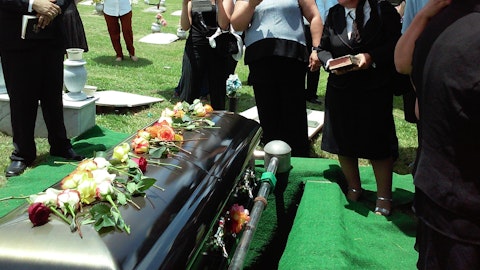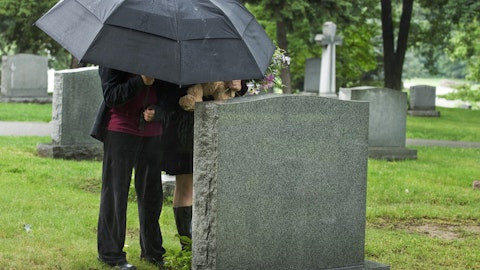Carlos Quezada: Absolutely. So if you remember, when we rolled this out, I mentioned the previous condition that we had where we had a lot of fragmented preneed sales companies and insurance agents or companies really. And now we have consolidated one insurance company and one Preneed seller. And so Pricoa, who is the one representing our businesses across Carriage portfolio, we’re able to integrate into the West fully for the third quarter of this year and started to integrate this quarter really for the Central region and will finish by January on the Eastern region. And so when you think about a year-over-year basis, I’m going to mention the prearranged funeral sales that included the old strategy for all the regions versus this year where we only have the Western region in the third quarter of 2023.
And so last year, we had $13.8 million of pre-arranged funeral sales. This year, with just the change of the Western region in the third quarter, we have $15.7 million of pre-arranged sales, that’s 13.9% increase on Preneed funeral volume. Now from a general agent commission perspective, last year, we received $352,000 for the third quarter of 2022. This year, we have received $465,000 in commissions, which is an increase of 31.9% on a year-over-year basis. That is a very significant improvement especially thinking or considering that only the West is in these numbers. Once we finish the fourth quarter, we’ll have the West and the Central in these numbers. And once we get into Q1 2024, we’ll have all of our Carriage. Over time, I mentioned this in the past, we do expect to grow at a 40% rate year-over-year from a GA revenue perspective, and that will increase over time as Pricoa continues to ramp up sales agents in the businesses where we operate and continue to really integrate into our model and with our leadership team.
J.P. Wollam: Great. That’s really helpful. And then if I could just squeeze one last 1 in for Kian. About — I think you made a comment in there about kind of a reduction in some maintenance CapEx to kind of give you a little flexibility on cash flow and certainly helpful in terms of paying down the credit facility. I know it’s maybe not much when we look on a dollar basis, but I’m just curious if that’s something that we could see more of going forward just in terms of kind of reallocating some CapEx dollars or anything else that you might think could help us in terms of free cash flow generation and ultimately delevering.
Kian Granmayeh: Yes, JP. So I’ll take the first crack at it, and then I’ll pass it over to Carlos in terms of what we’re doing in the field when it comes to maintenance CapEx. But from a financial perspective, we’re just — we’re focused on the cost side. We’re focused on paying down our debt. So it’s really high grading and prioritizing these projects that we need to spend money on. And differentiating between what’s discretionary in nature and kind of what is a must have. And that’s just something we’ve been focusing on, so that way we do pay down our debt. Because as I mentioned, our variable rate debt is trending around 9% in terms of interest rates. So we’re just trying to prioritize our capital allocation here.
Carlos Quezada: And what I’ll add to that is — if you look at our balance sheet, you have the front cash flow, the acquisition of Green Lawn, which was very significant. We can’t forget that we’ve invested over $40 million on that business from cash flow generation. In addition to that, we have been able to do a really, really good work as it relates to managing CapEx on both ends, growth and maintenance. From a growth perspective, we have not stopped growth opportunity because Preneed cemetery has done an amazing job. In fact, we have put a significant amount of capital this year to make sure we have enough inventory to continue to accelerate sales especially in the new businesses that we have. We have opened a new garden at Green lawn.
We are about to start construction in Forest Lawn East in Charlotte and the same in the businesses we already have like Oakmont, Rolling Hills and [indiscernible] every cemetery as well. From a maintenance perspective, we’ve been more conservative making sure that our capital allocation decisions are based on where the capital is generating the highest return. If it’s an emergency, we can, of course, invest in it and make sure that the families are served well, taken care of. If it is something we can manage over a couple of years, then we allocate that capital towards interest payments because, as you know, that’s what the cash is going right now at a very significant rate. And so we want to make sure we manage that very, very well without putting families at risk or business at risk or decreasing the quality of service.
Operator: And this concludes today’s question-and-answer session. I’ll now turn the floor to Carlos Quezada for any additional or closing remarks.
Carlos Quezada: We want to thank all of you for joining the call today. I want to share that we have a very strong company with tremendous fundamentals. We do have significant debt. We’re working on it. We will continue to focus our cash — free cash flow into paying down our debt as much as we can accelerate that repayment and lower interest expense. We’ll continue to focus on growth on a same-store and acquisition basis, especially through Preneed sales on both in cemetery and pre-arranged funerals. We’re very excited about the performance we just presented to you from an operational perspective in the businesses. We continue to grow. We continue to put some really good numbers on the board and we hope to report even better numbers that we continue to have these calls, and we’ll talk to all of you in February. Thank you very much, and we’ll talk to you soon.
Operator: Thank you. This does conclude today’s teleconference. We thank you for your participation. You may disconnect lines at this time.
Follow Carriage Services Inc (NYSE:CSV)
Follow Carriage Services Inc (NYSE:CSV)
Receive real-time insider trading and news alerts


